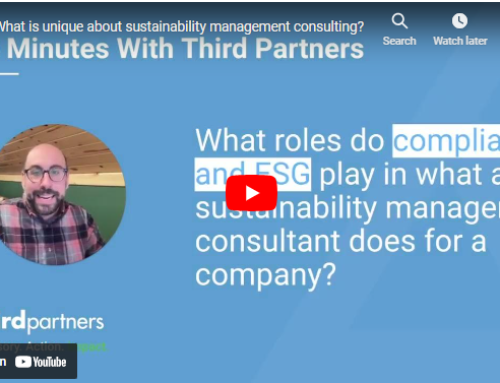What kinds of companies should worry about plastic, and why?
Single-use plastic is prevalent in a variety of industries, including construction, manufacturing, healthcare, and apparel. Discarded plastic often travels from cities along rivers into oceans, where it can injure and kill wildlife. The scale is massive: at least 8 million tons of plastic enter the oceans each year. Furthermore, most plastic is made from petrochemicals, meaning the plastic industry has close ties to the fossil fuel industry, a major emitter of heat-trapping greenhouse gases that cause climate change. For these reasons and others, finding solutions to reduce plastic pollution should be top-of-mind at organizations that value sustainability.
“Plastic neutral” as a pollution solution
Taking a step back, you might be familiar with “carbon neutral” companies, which claim net-zero carbon emissions. In pursuit of this claim, the companies may purchase carbon credits that support climate-friendly activities (e.g., growing trees), aiming to offset the amount of carbon dioxide emissions resulting from their business activities. Though not perfect, the market for carbon credits is established and standardized, with roots in the United Nations.
This brings us to a newer trend in solutions for plastic pollution: “plastic neutral” companies. They aim to cancel out the amount of plastic that they produce by supporting projects that allege to clean up an equivalent amount of plastic pollution. Despite the similar terminology, there are key differences between companies’ carbon neutral and plastic neutral claims. Plastic credits lack the standardization of carbon credits; the landscape of plastic neutrality is more like the Wild West and raises concerns about potential risks such as irresponsible management of the plastic pollution after it has been collected, continued pollution of more plastic, and misleading marketing (greenwashing).
Alternative solutions to plastic credits and offsets
Given the serious environmental consequences of single-use plastics, we commend companies that are looking to reduce their plastic footprint. However, we believe that the following approaches are more effective solutions to plastic pollution and less risky than purchasing plastic credits:
- Changing business operations to minimize single-use plastics at the source
- Supporting organizations (on a non-credit basis) that responsibly collect and repurpose plastic – one example is First Mile, which has built a supply chain from collecting plastic in low-income countries to spinning it into a soft yarn that can be used in clothing and other consumer goods
If your organization is looking for solutions to plastic pollution, Third Partners can help you to simplify your organization’s plastic strategy and avoid risk, without relying on credits. Contact us for a free consultation.



